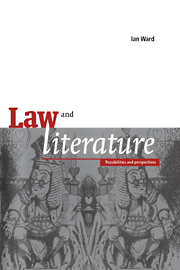1 - Law and literature: a continuing debate
Published online by Cambridge University Press: 29 September 2009
Summary
Students seek out good teaching to learn not the rules but the culture, for the rules are everywhere the same.
The purpose of this introductory chapter is essentially synoptic. Indeed there is a very tangible sense in which, after more than a decade of the renewed law and literature ‘debate’, it seems appropriate to a number of the debaters to look back and take stock. This is not to suggest any running out of ideas or cooling in the heat of debate, but rather, as both Brook Thomas and Richard Posner have recently suggested, because law and literature is becoming increasingly ‘serious’. It is now sixteen years since Allen Smith predicted the ‘coming renaissance in law and literature’, and an ancillary purpose of this first chapter is, then, not only to examine the various positions taken in the ‘debate’, but also to impress its enduring strength. The familiar distinction taken in law and literature studies is between ‘law in literature’, and ‘law as literature’. Essentially, ‘law in literature’ examines the possible relevance of literary texts, particularly those which present themselves as telling a legal story, as texts appropriate for study by legal scholars. In other words, can Kafka's The Trial, or Camus's The Fall, tell us anything about law? ‘Law as literature’, on the other hand, seeks to apply the techniques of literary criticism to legal texts. Although both convenient and essentially effective, it is not always possible to sharply delineate the two approaches, or indeed desirable to do so.
- Type
- Chapter
- Information
- Law and LiteraturePossibilities and Perspectives, pp. 3 - 27Publisher: Cambridge University PressPrint publication year: 1995



